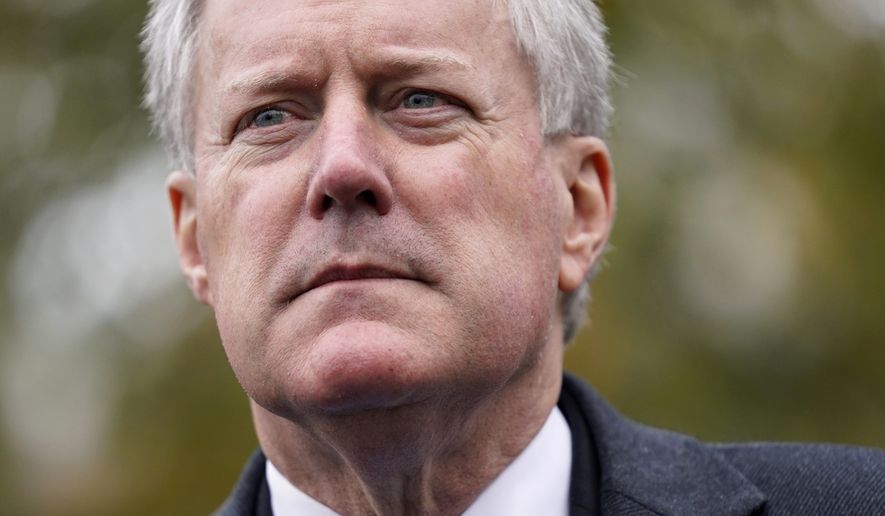The House committee investigating the Jan. 6 attack on the Capitol voted Monday to hold former Trump White House Chief of Staff Mark Meadows in contempt of Congress after he twice failed to appear for scheduled depositions.
The matter now proceeds to the full House for a vote. If passed, a criminal referral will be forwarded to the U.S. Attorney’s office recommending Mr. Meadows’ prosecution.
“Whatever legacy he thought he left in the House, this is his legacy now,” Rep. Bennie G. Thompson, Mississippi Democrat and the panel chairman, said of Mr. Meadows, who served as a member of Congress before joining the Trump administration.
“Mr. Meadows has put himself in this situation and he must now accept the consequences,” he said.
Mr. Meadows is the third former official the committee has voted to hold in contempt in response to their claims of immunity rooted in former President Donald Trump’s claims of executive privilege.
President Biden has sought to overrule that claim and a federal appeals court has rejected it.
Despite the escalating legal toll, key witnesses continue to push back on the Democrat-run committee’s work, which many Trump supporters view as a purely partisan attempt to smear Republicans. Members of the committee and most Democrats maintain that the probe aims only to uncover the truth surrounding the events.
Monday’s vote follows months of back-and-forth between the panel and Mr. Meadows’ legal team in response to a subpoena issued in late September.
Mr. Meadows has bucked the panel’s demands to appear for two separate depositions. His lawyer, George Terwilliger III, asserted that Mr. Meadows remained “immune” from the committee’s probe, citing former President Donald Trump’s claims of executive privilege.
After failing to appear for the first time, Mr. Meadows briefly signaled intent to cooperate, which he abruptly withdrew after the two parties failed to reach an agreement on the terms under which Mr. Meadows would cooperate.
On Wednesday, Mr. Meadows sued House Speaker Nancy Pelosi, California Democrat, and members of the select committee for relief from the panel’s subpoenas which he describes as “overly broad and unduly burdensome” and which he says were issued “without legal authority in violation of the Constitution and laws of the United States.”
Mr. Meadows also raised concern about subpoenas issued by the committee compelling him and a “third-party telecommunications company” to provide information that it “lacks lawful authority to seek and to obtain.”
In a report issued late Sunday, the committee confirmed that Mr. Meadows had turned over a trove of documents including emails and text messages. The lawmakers said the documents raised several questions they intended to address at a deposition scheduled for last week, for which Mr. Meadows failed to appear.
Among the documents Mr. Meadows provided were details surrounding communications between members of Congress and rally organizers on Jan. 6, and messages among aides as the attack on the Capitol unfolded.
The committee’s report also describes correspondence between Mr. Meadows and an unidentified individual in which Mr. Meadows stages that the National Guard would be present to “protect pro-Trump people.”
The committee has not released the documents provided by Mr. Meadows in full, but members of the committee read several text messages they had obtained.
Committee Vice-Chair Liz Cheney, Wyoming Republican, detailed several messages in which people present at the Capitol during the attack alerted Mr. Meadows to the gravity of the situation.
Ms. Cheney also detailed several messages from Fox News personalities calling on Mr. Meadows to convince President Trump to deescalate the situation.
In another exchange, Donald Trump Jr. and Mr. Meadows discussed the need for the President to condemn the attack.
“These text messages leave no doubt, the White House knew exactly what was happening here at the Capitol,” Ms. Cheney said.
Rep. Adam Schiff, California Democrat, read one text in which an unnamed lawmaker told Mr. Meadows that Vice President Mike Pence “should call out all electoral votes that he believes are unconstitutional.”
In another message on Jan. 7, one lawmaker said: “Yesterday was a terrible day. We tried everything we could in our objection to the 6 states. I’m sorry nothing worked.”
Members of the committee also took issue with Mr. Meadow’s stonewalling of the committee amid the recent release of his book “The Chief’s Chief,” in which he publicly discusses the events on Jan. 6.
Mr. Meadows is among several witnesses that have leaned on the president’s legal claims as justification for stalling the committee.
The committee has also voted to hold former White House adviser Steve Bannon and former Department of Justice official Jeffrey Clark in contempt for failing to comply with subpoenas.
The committee delayed forwarding Mr. Clark’s recommended charges to the full House, pending his appearance before a last-chance deposition later this month.
The House voted to hold Mr. Bannon in contempt following the committee’s recommendation. Mr. Bannon has been indicted by the Justice Department and his case is ongoing.
“If you are listening at home, Mr. Bannon, Mr. Meadows, Mr. Clark, I want you to know this: history will be written about these times, about the work this committee has undertaken and history will not look upon any of you as martyrs,” Mr. Thompson said Monday. “History will not look upon you as a victim. History will not dwell on your long list of privilege claims or your legal sleight of hand.”
• Joseph Clark can be reached at jclark@washingtontimes.com.




Please read our comment policy before commenting.